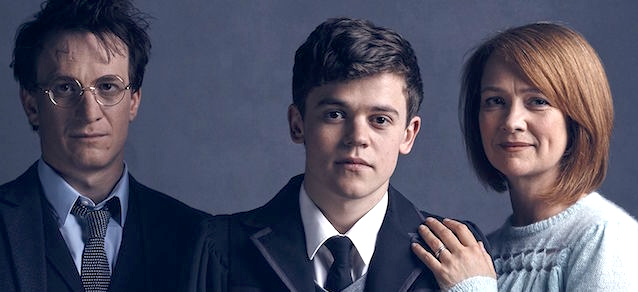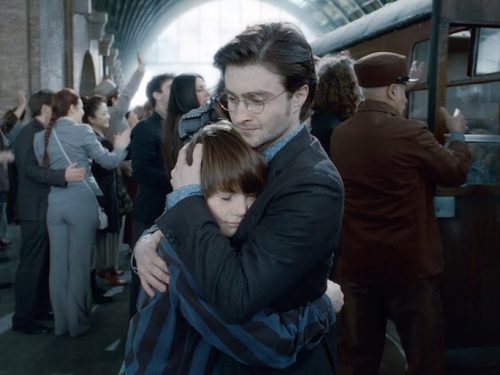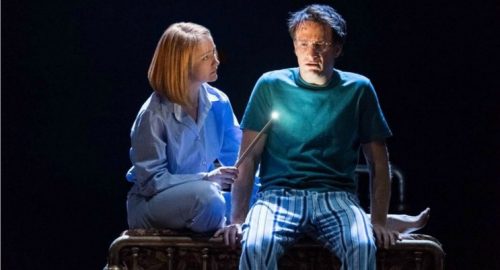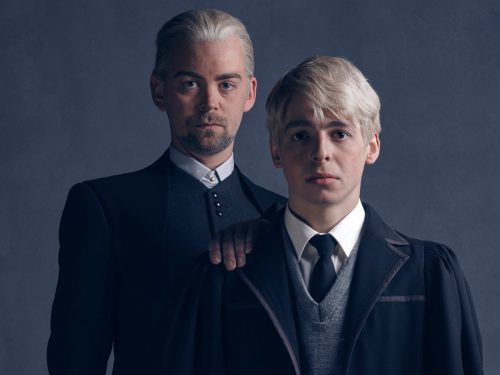
A quick disclaimer before reading: I will be giving a positive review of Harry Potter and the Cursed Child. I will, in the words that follow, go so far as to recommend Harry Potter fans read it. So there. If you’ve already decided that the seven books will be the only books, that you will never touch the apocryphal supplements that come via screen or stage, I will not call you a pureblooder…that decision, to close eyes, ears and hands to some idea of magical purity–that’s entirely your decision. A rather pretentious one, I’ll grant, but your decision nonetheless. Everyone else, read on. Aparecium.
The only reason I grant that pass to the close-minded is because I don’t believe I can change their mind. The book can, I can’t. And the reason I know that is because it happened to me. I, too, was a pureblooder, until someone (DZ) rudely placed the book on my desk. Of course, I had to read it. But before that, I was very skeptical about the whole idea of The Cursed Child. The original seven were so self-contained, so remarkably complete. Any attempt at adding to the story, either before or after Harry’s seven years at Hogwarts, risked discrediting the centrality of his role in the world of magic.
I know I’m not the only one who found the “20 years later” episode at the end of Deathly Hallows a bit cornball, especially given the power of what had just come before it. And so the idea of making a play–a story, a tv series, a book, anything–based off of that exact episode, that sounded pretty misguided. Not only did it fall into the “ain’t broke–don’t fix” accusations, going from that stupid train scene seemed lame.
Let me tell you, though–lame it is not. While critics will inevitably opine that this was a misplay, that this marks the end of an amazing fantasy series and the beginning of a Rowling ego franchise, I have come to find joy in the move. Whether or not it was a misplay by Rowling, to me, it is a heartening indication of, well, play. Freedom. Instead of corralling her magical universe into the seven books the world has deemed complete, Rowling seems willing to continue having fun in it. To me it seems like an executive decision made without fear. The fact that she has taken on this project at all is evidence of this. To have created a play with two others–theater masters Jack Thorne and John Tiffany–shows she’s not interested in safeguarding her universe. (This after all, is what the play is about, but I’m getting ahead of myself…) The seven novels will always be gates through which readers enter (and re-enter) Hogwarts–the fact that this book is a play and not a novel is a testament to this–but who wouldn’t, at a moment’s notice, take that train again?
Okay. I’ll stop preaching and get to the story. It must be said, even after all that defending, that the writing style in Cursed Child is jarringly different from Rowling’s. Little is left for inference in a script, I suppose, but the story is more direct and more (too much, even) emotionally charged than her novels ever were. The payoff for this emotionalism is not always apparent; at times it feels as if we don’t know the characters well enough to see them react the way they do.
Who are the characters? The story centers around Albus Potter, Harry and Ginny’s youngest child, and Albus’ best friend (only friend) Scorpius (you guessed it) Malfoy. In so many ways, Albus is the antitype of the young Harry–he is friendless, terrible on a broom, and worst of all, a Slytherin. Despite the fame his last name should grant him, Albus is an anomaly, and he knows it. He feels this dissonance most potently from his father, of all people. Harry cannot understand his son, cannot figure how a boy his age could possibly hate going to school at Hogwarts.
Conversely, the nicest boy to Albus is the son of Draco Malfoy, a brilliant turn by Rowling and company. Scorpius–a fellow loser–is also bright, Hermione-bright. But he’s also funny and insuperably kind. This is case despite the fact that he is the butt of a horrific rumor: that he is actually the orphan child (the “cursed child”) of Lord Voldemort.
With both of these characters–and the parents responsible for them–we find a dramatic inversion of the good guy-bad guy typecasting of the seven books. One of the most salient anti-HP arguments is the one-sided characterizations so many central figures are set to. Slytherins are almost always bad, Gryffindors are good even when it means death. Here, though, the lines cross.
This is most notable in the ways that Harry himself has changed. Just pages into the book, Harry has exasperated his son–who is lonely at school–demanding why he can’t just be more like his brother and sister. Noble Harry has become a control freak, defined more by his need to protect his family than actually love them. While the plot of the play is driven by a misadventure taken by Albus and Scorpius, it is plain that the misadventure is prompted by Harry’s expectations and Albus’ own feeling of inadequacy. A painting of Dumbledore at Hogwarts tells Harry as much:
Harry: I’ve never asked how you felt about me naming him after you, have I?
Dumbledore: Candidly, Harry, it seemed a great weight to place upon the poor boy.
Harry: I need your help. I need your advice. Bane says Albus is in danger. How do I protect my son, Dumbledore?
Dumbledore: You ask me, of all people, how to protect a boy in terrible danger? We cannot protect the young from harm. Pain must and will come…I have formed the impression that–perhaps–you are blinded by your love for him.
Harry: Blinded?
Dumbledore: You must see him as he is, Harry. You must look for what’s wounding him.
This is the central theme of the play, the agonizing reality that we are blinded by love, and thus co-conspirators in their harm. On one hand, our love keeps us from freeing them to live lives of their own. We protect when we ought to release. On the other hand, we are blind to the good that may come through painful experiences. When we love someone, “wanting what’s best” for them is muddied by our own fear of their suffering. Magic or muggle, love often instills in us a belief that we can write the story to evade it. Despite the fact that Harry was led to his own alienation as a child at Hogwarts, he cannot allow that danger to his own children.
Without giving away much, danger comes anyways. Albus’ and Scorpius’ misadventure is prompted (and continued) by a time-turner, much like the one Hermione used in the Prisoner of Azkaban. And through this time-turner, we have the thrill of revisiting some of our favorite (and most hated) friends of old–from Cedric Diggory, to Dolores Umbridge, to our old friend, Severus Snape.
The real dark horse in The Cursed Child, though, comes in the unlikeliest of places; a man who has transformed since we first met him in Year One–Draco Malfoy, former Death Eater, perennial bigot. And what has changed him? Love. And suffering. Malfoy, who married his wife Astoria, felt for the first time what it was not to be lonely. He was brought to the end of himself. Astoria, though, became sick after giving birth, and in the effort to safeguard his family from suspicion, took them into hiding. Astoria later died. Draco realizes, before Harry even does, that “hiding him away from this gossiping, judgmental world, I ensured that my son would emerge shrouded in worse suspicion than I ever endured.” It is only through Draco’s suffering that Harry is able to see what he’s done to Albus:
Harry: Love blinds. We have both tried to give our sons, not what they needed, but what we needed. We’ve been so busy trying to rewrite our own pasts, we’ve blighted their present.
They are left to join forces and go back in time. Back to where it all began, for us and for Harry. In a dramatic ending, we are brought to the conclusion that love, if it is love at all, must return to the wounds that cursed us, and does not seek to change them.

COMMENTS
3 responses to “The Blessing of The Cursed Child”
Leave a Reply

















Well, thanks a lot Ethan (sarcastically), this pureblooder is going to have to stop reading all his evangelically correct books and start reading/watching any HP stuff I can get my hands on.
This post is so illuminating, Ethan! Especially appreciate your thoughts on Rowling & her freedom to hold her world loosely & how that is a mirrored theme in the story. Finished the book in a snap on the plane–it’s definitely fun (too much fun in some places?? haha). I can only imagine what a ride it would be to see the play live.